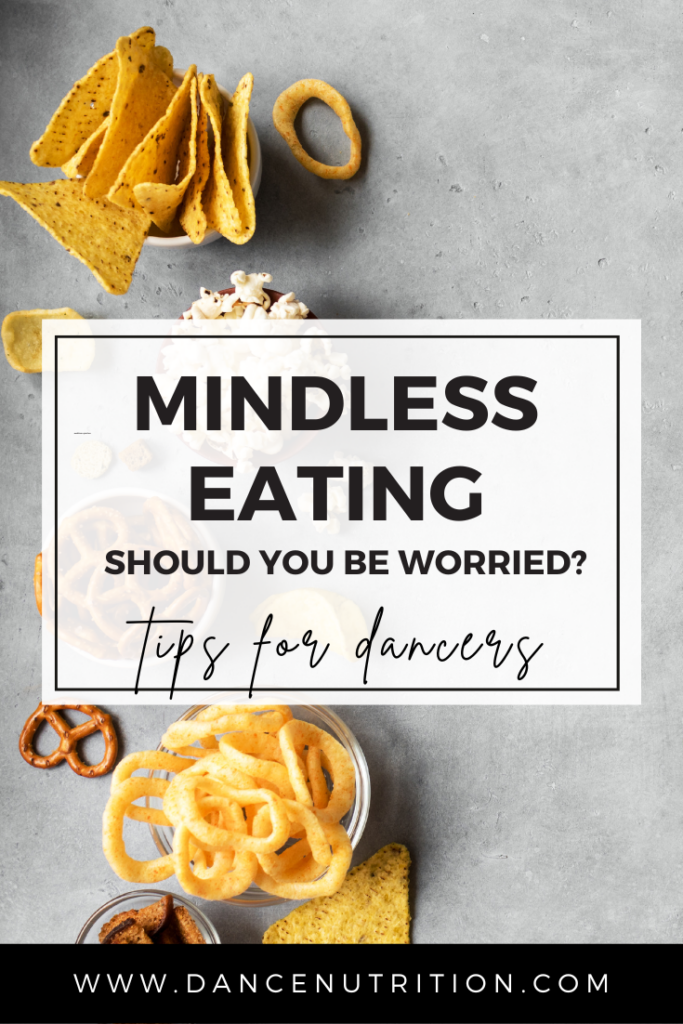Mindfulness is encouraged as a tool to support eating experiences that feel satisfying— in my work as a dietitian for dancers, I encourage dancers to use mindful eating to help promote body attunement. But mindful eating isn’t always accessible and for many dancers, mindless eating is the reality.
Mindless eating sometimes referred to as “noshing” or “grazing”, is often scrutinized in our culture as a behavior that needs to be intervened upon to avoid “over”-eating. But mindless eating can provide us with good feedback— a sign that our bodies are needing something to move through discomfort, whether that’s physical discomfort or mental and emotional discomfort. Mindless eating, as a form of emotional eating (like boredom eating and stress eating), is a coping tool. This article will discuss the most common reasons why dancers might mindlessly eat, and offer actionable steps to navigate the experience.
5 common reasons for mindless eating
#1: You’re seeking comfort
As a product of emotional eating, mindless eating might be one of your coping tools for seeking comfort during an otherwise uncomfortable emotion. As previously discussed, heightened emotional triggers can be either positive, like joy, or negative, like stress and anxiety. Contrary to what we’re often told, there is nothing inherently wrong with using food as a tool to cope. It’s just important to acknowledge that food serves only as a temporary coping tool— and likely won’t help to intervene upon the true reason for your emotional distress.
#2: Your baseline meal plan is too restrictive
Not eating enough to support your body’s baseline calorie needs is a very common reason for mindless eating. In this instance, mindless eating is an understandable biological response— your body needs enough fuel to move through the day and as a result, hormonal shifts occur that increase your desire to eat.
#3: You’re navigating rigid food rules
Strict food rules might be another reason why you’re relying on mindless eating. When attempting to abide by these rules, it’s easy to feel limited. Mindless eating offers a sense of exploration that is spontaneous and liberating. If your baseline meal plan doesn’t leave room for unstructured spontaneity, then mindless eating might be a sign of a restrictive lifestyle. Food rules that are coupled with the restrictive caloric intake mentioned above also create a recipe for increased cravings, which can turn otherwise harmless periods of mindless eating into experiences of eating past physical comfort.
#4: You’re bored
Similar to emotional eating, boredom eating offers a degree of sensory gratification and ultimately, comfort during times that feel less productive. While you might not associate boredom with emotional distress, it’s common for dancers to struggle with the reality of doing nothing. But it’s normal and okay to do nothing. For some dancers, doing nothing may actually be the break that is needed to prevent burnout.
#5: You’re distracted
Ever watch TV, scroll your phone, or attend a movie and find yourself eating mindlessly? You might also experience this at social events. As with all of the instances mentioned above, there is not inherently wrong with eating while distracted, but distracted eating makes it difficult for us to identify and honor fullness cues. This can leave you eating to a point past physical comfort. The dieting mentality can exacerbate this if you’re prone to an all-or-nothing mindset around food.
How to overcome mindless eating
Whatever your reason might be (or perhaps it’s a few), let’s discuss how to shift our perspective around mindless eating. Experiences of mindless eating are pieces of evidence that can be used to evaluate whether or not our current meal plan and relationship with food are supporting us. Instead of ridiculing yourself about a mindless eating experience, utilize non-judgemental curiosity to explore its roots:
- Is there something else that I can do right now to support myself? Chatting with a friend, listening to music, etc.
- Am I taking on too much? Perhaps I’m nearing burnout and using mindless eating to distract myself from this discomfort.
- Am I being too rigid with my food choices? “Clean” eating is a common example.
- Am I not eating enough? As mentioned above, emotional eating (like mindless eating) is often a natural response to deprivation. Consider practical hunger is a helpful technique to navigate this obstacle.
It’s possible that your experience(s) with mindless eating is less problematic and more reflective of your body needing more support, care, and food to better meet your body’s daily needs. Unraveling these causes in a way that’s not judgemental can help you identify what is most needed at the moment. From there and only if it’s accessible, you can consider mindful eating techniques— but beware, it’s not possible to eat mindfully 100% of the time and when you strive for this, you risk turning this otherwise helpful tool into an unhelpful goal.



